Dynasty
Umar Ibn Abubakar Garbai of Borno | ||
| Regnal titles | ||
|---|---|---|
| Preceded by | 12th Shehu of Borno 1968–1974 | Succeeded by |
| | This biography of a member of an African royal house is a stub. You can help Wikipedia by expanding it. |
| Umar Ibn Abubakar Garbai of Borno | |
|---|---|
| Reign | 1968–1974 |
| Predecessor | Umar Ibn Muhammad of Borno |
| Successor | Mustafa Ibn Umar El-Kanemi of Borno |
| Died | 1974 Borno |
| Dynasty | Kanemi |
| Father | Abubakar Garbai of Borno |
| Religion | Muslim |
Shehu Umar Ibn Abubakar Garbai was the Shehu of Borno from 1968 to 1974.
Shehu Umar Ibn Abubakar Garbai (son of Shehu Abubakar Garbai of Borno) was the Shehu of Borno from 1968 to 1974.
Sheriff, Bosoma, Muhammad Fannami, and Abba Rufai Tijani, Functions of Shettima Kanuribe: Instances in the Shehu of Borno's Palace (Maiduguri: Desktop Investment Ltd., 2011).
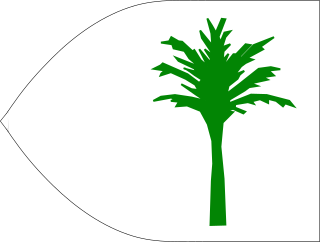
The Kanem–Bornu Empire existed in areas which are now part of Nigeria, Niger, Cameroon, Libya and Chad. It was known to the Arabian geographers as the Kanem Empire from the 8th century AD onward and lasted as the independent kingdom of Bornu until 1900.
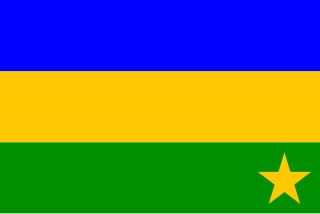
The Kanuri people are an African ethnic group living largely in the lands of the former Kanem and Bornu Empires in Niger, Nigeria, Chad, Libya and Cameroon. As well as a diaspora community residing in Sudan. Those generally termed Kanuri include several subgroups and dialect groups, some of whom identify as distinct from the Kanuri. Most trace their origins to ruling lineages of the medieval Kanem-Bornu Empire, and its client states or provinces. In contrast to the neighboring Toubou or Zaghawa pastoralists, Kanuri groups have traditionally been sedentary, engaging in farming, fishing the Chad Basin, trade, and salt processing.
Borno may refer to:
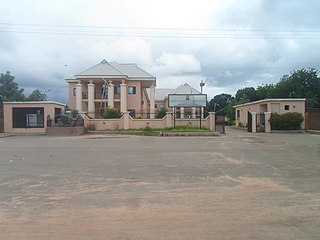
The University of Maiduguri (UNIMAID) is a Federal higher institution located in Maiduguri, the capital city of Borno State in Northeast Nigeria. The university was created by the federal government of Nigeria in 1975, with the intention of its becoming one of the country's principal higher-education institutions. It enrolls about 25,000 students in its combined programs, which include a college of medicine and faculties of agriculture, arts, environmental science, Allied health science, Basic medical science, dentistry, education, engineering, law, management science, pharmacy, science, social science, and veterinary medicine. With the encouragement of the federal government, the university has recently been increasing its research efforts, particularly in the fields of agriculture, medicine and conflict resolution, and expanding the university press. The university is the major higher institution of learning in the north-eastern part of the country.

Rabih az-Zubayr ibn Fadl Allah or Rabih Fadlallah, usually known as Rabah in French, was a Sudanese warlord and slave trader who established a powerful empire east of Lake Chad, in today's Chad.
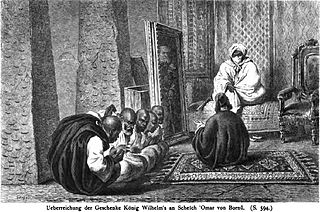
Umar I ibn Muhammad al-Amin or Umar of Borno was Shehu (Sheik) of the Kanem-Bornu Empire and son of Muhammad al-Amin al-Kanemi.

Shehu al-Hajj Muhammad al-Amîn ibn Muhammad al-Kânemî (1776–1837) was an Islamic scholar, teacher, religious and political leader who advised and eventually supplanted the Sayfawa dynasty of the Kanem-Bornu Empire. In 1846, Al-Kanemi's son Umar I ibn Muhammad al-Amin became the sole ruler of Borno, an event which marked the end of the Sayfawa dynasty's eight hundred year rule. The current Shehu of Bornu, a traditional ruler whose seat remains in modern Borno State, Nigeria, is descended from Al-Kanemi.
The Borno Emirate, or Borno Sultanate, is a traditional Nigerian state that was formed at the start of the 20th century. It is headed by the descendants of the rulers of the Bornu Empire, founded before 1000. The rulers have the title Shehu of Borno. The traditional emirate of Borno maintains a ceremonial rule of the Kanuri people, based in Maiduguri, Borno State, Nigeria, but acknowledged by the 4 million Kanuri in neighbouring countries.

Abu Bakr bin Ibrahim al-Kanemi CBE, was the Shehu of Bornu from 1902 to 1922.
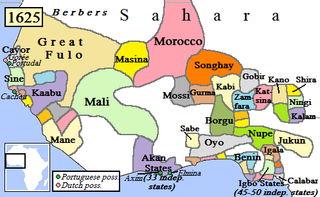
Nigerian traditional rulers often derive their titles from the rulers of independent states or communities that existed before the formation of modern Nigeria. Although they do not have formal political power, in many cases they continue to command respect from their people and have considerable influence in their community.
The Dikwa Emirate is one of the successor states to the old Bornu Empire, a traditional state within Borno State, Nigeria. It was established in 1901 at the start of the colonial period after the Bornu empire had been partitioned between the British, French and Germans.
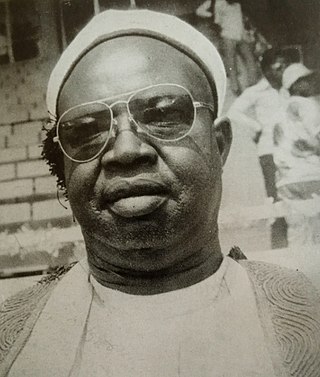
Abubakar Umar Suleiman was turbaned as the 11th Emir of Bade on 12 November 2005. He is head of the traditional state of Bade with headquarters in Gashua, Yobe State, Nigeria.
Bukar or Bukar Kura bin Umar al-Kanemi was Shehu of Borno from 1881 to c. 1884.

Shehu Umar Sanda ibn Ibrahim Kura al-Kanemi was the Shehu of Borno from 1922 to 1937. He was the son of Shehu Ibrahim Kura of Borno and brother of Shehu Abubakar Garbai.
Shehu Umar Ibn Muhammad also known as Shehu Sanda Kyarimi, CBE, CMG, KBE, was Shehu of Dikwa between 1922 and 1937 and Shehu of Borno from 1937 to 1967.

Shehu Mustafa Ibn Umar El-Kanemi was the Shehu of Borno from 1974 to 2009.

Abubakar Ibn Umar Garba Al Amin El-Kanemi Shehu Of Borno is the Shehu, or traditional ruler, of the Borno Emirate in northeast Nigeria.

Hausa literature is any work written in the Hausa language. It includes poetry, prose, songwriting, music, and drama. Hausa literature includes folk literature, much of which has been transcribed, and provides a means of recording, preserving, and transmitting knowledge, especially in regard to social, psychological, spiritual, or political roles.
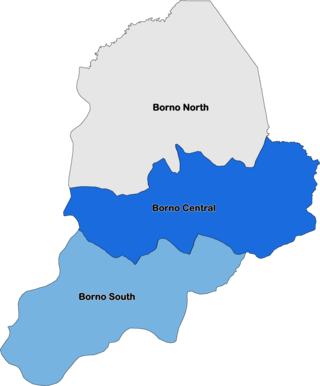
The 2023 Nigerian Senate elections in Borno State will be held on 25 February 2023, to elect the 3 federal Senators from Borno State, one from each of the state's three senatorial districts. The elections will coincide with the 2023 presidential election, as well as other elections to the Senate and elections to the House of Representatives; with state elections being held two weeks later. Primaries were held between 4 April and 9 June 2022.
The Borno Central Senatorial District in Borno State, Nigeria covers the local government areas of Bama, Dikwa, Jere, Kaga, Kala/Balge, Konduga, Mafa, Maiduguri, and Ngala. The senator currently representing the district is Kaka Shehu Lawan, he was elected in 2023 under the platform of the All Progressives Congress, to succeed Vice President Kashim Shettima.